Disclosure: Meeple Mountain received a free copy of this product in exchange for an honest, unbiased review. This review is not intended to be an endorsement.
Soda, pop, cola, Coke, or soft drink: whatever you call it, carbonated water and sugar has gradually moved from pharmacies and soda fountains into almost every household in America. How did this happen? In a word: marketing.
Top Pop from Talon Strikes Studio puts you in charge of a 1960s cola company trying to spread their sugary drinks across the United States of America. Market share is everything. Bid for control of Cities in your quest to be the Top Pop!
Once You Pop…
Top Pop is satisfyingly simple. The goal of the game is to collect numbered City cards by having the highest bid on a card. The numbers on these City cards correspond to the number of copies of that City in the deck. Bids are managed through stacks of colored (bottle) caps: if you have the highest stack on any City at the start of your turn, you take that card into your face-down scoring pile. Collecting the majority of one City will earn points at the end of the game, as will having a spread of Cities.
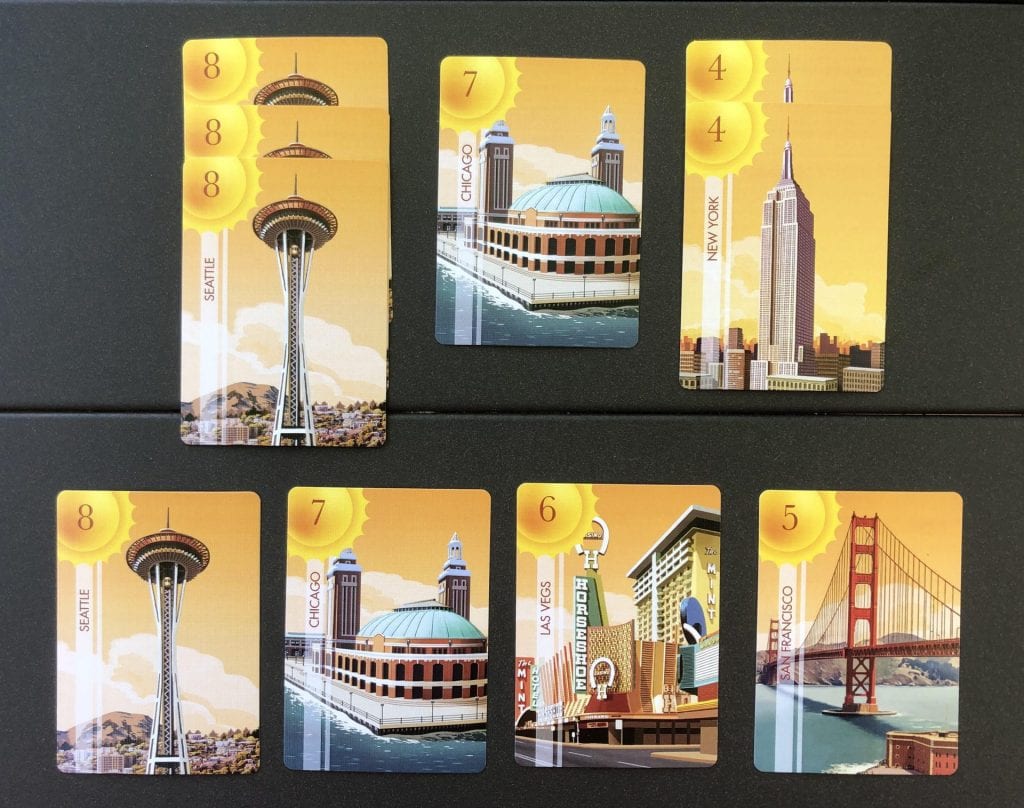
On each player’s turn they’ll scoop up any Cities they won, play a new City to the table, and grab a cap or two from the supply. Next they’ll place stacks of caps onto various cards to bid on them and finally draw a new card into their hand. Easy-peasy.
The central element of Top Pop is the way that caps are stacked. Each stack represents that player’s bid. A player can have stacks on multiple different Cities, but cannot place multiple stacks on any given card in play. Instead, they will add to their stack on a card to increase their bid. If a player wishes to bid on a card, they must make their stack at least 1 cap higher than the tallest stack currently on the card: in poker parlance, you can raise but you can’t call. The new bid must contain at least one cap of the current high bidder’s color (if any) and the top cap of any stack must be in the color of the bidding player. In other words, if you want to outbid someone, you have to add a cap of your color and one of theirs.
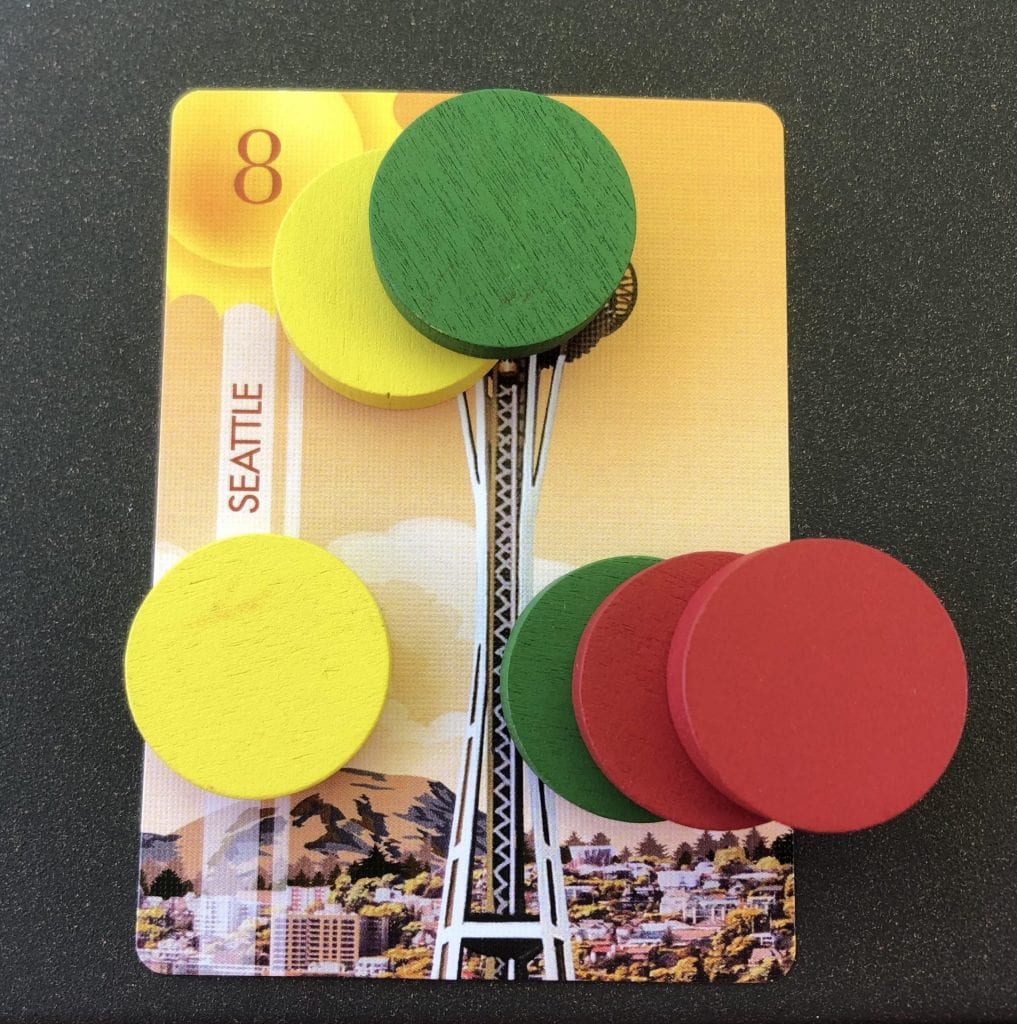
On each player’s turn, they’ll get 1 free cap of any color of their choice. That’s it. It’s probably obvious, but if each new bid requires at least 1 cap in the player’s color and possibly also needs a cap in another player’s color, that 1 free cap a turn isn’t going to cut it. So how do players get more caps? Two ways: by playing a City card and resolving winning bids.
Every turn the active player will play one of their City cards to the table. Where they put that card matters. They can place it in front of themselves for no immediate gain. If they place it in front of another player, they get an extra cap in that player’s color: counting the freebie, that’s just enough to beat that player in a single bid.
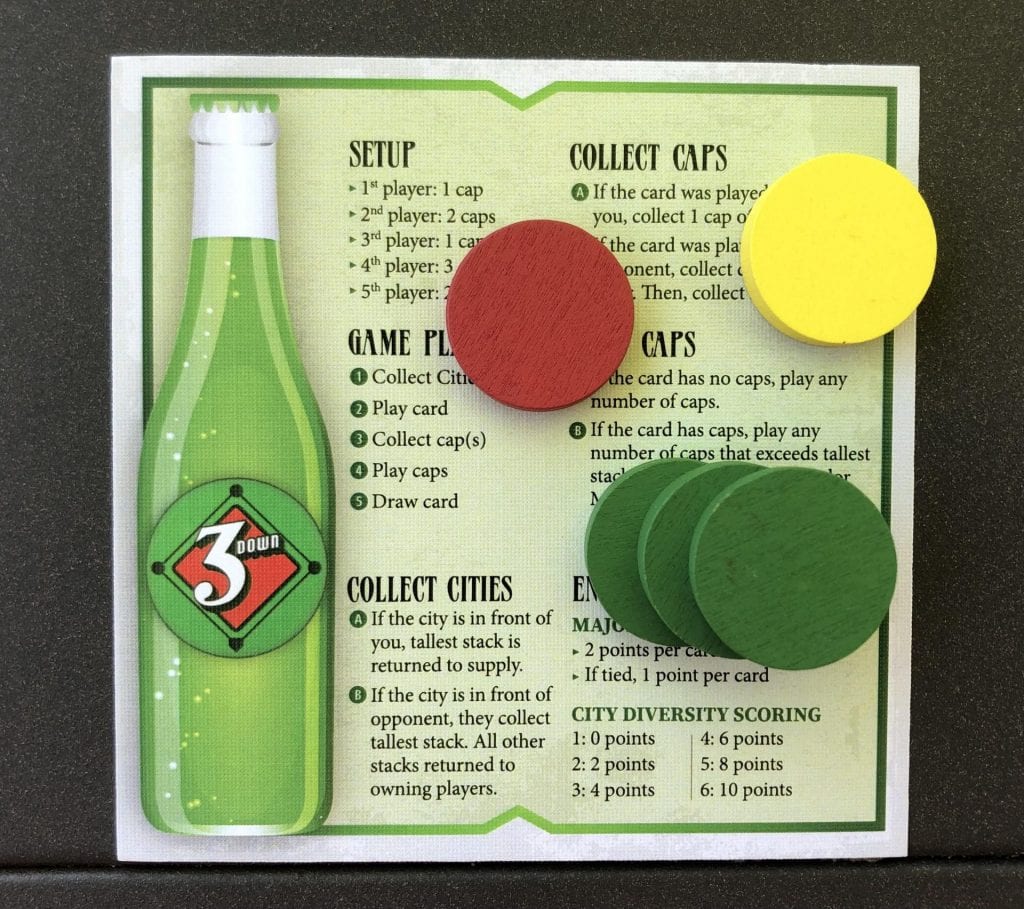
The other way to gain caps is a little trickier. Whenever a card is won, the losing players get their stacks back. The dispensation of the winning bid will depend on where the card is placed relative to the winner. If a player wins a card in front of them, their winning bid gets sent back to the supply. If a player wins a card in front of someone else, the winning bid goes to that second player instead. In short: players want to win cards that are placed in front of themselves so that their opponents don’t get extra caps…but placing cards in front of players is how players get the caps they need to make higher bids. It’s a clever conundrum that makes each card and cap feel important.
At the end of the game, players claim any of their winning bids that remain and score their collected City cards. If a player has more of a specific City than the other players, they score 2 points for each card of that City; if it’s a tie, they score 1 point per card. No points are awarded to the players who have the minority stake in that City. Players also score a number of points for each different City appearing in their collection, with higher points earned for a wider variety.
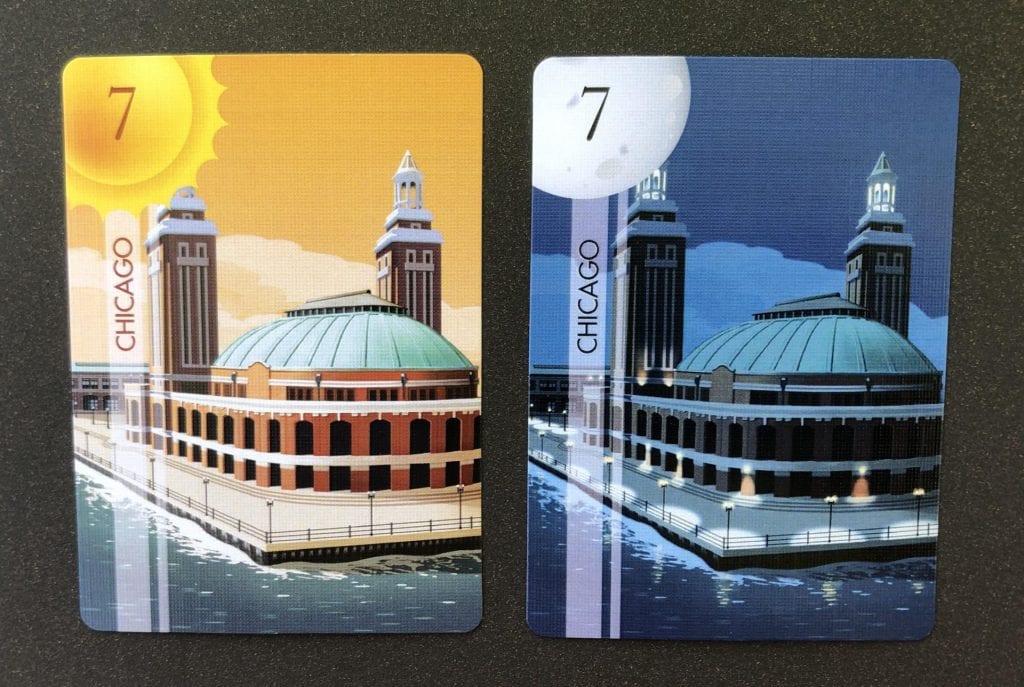
The basic game comes with a selection of Night cards which must be placed face-down, adding to the uncertainty around each player’s strategy. Advanced players can introduce a handful of bonus cards, each of which offers a game-warping effect to the player who most recently claimed a card of the matching number. There’s even a rather large list of scenarios that feature different ability cards as well as rules variations, ensuring that Top Pop has a lengthy shelf life.
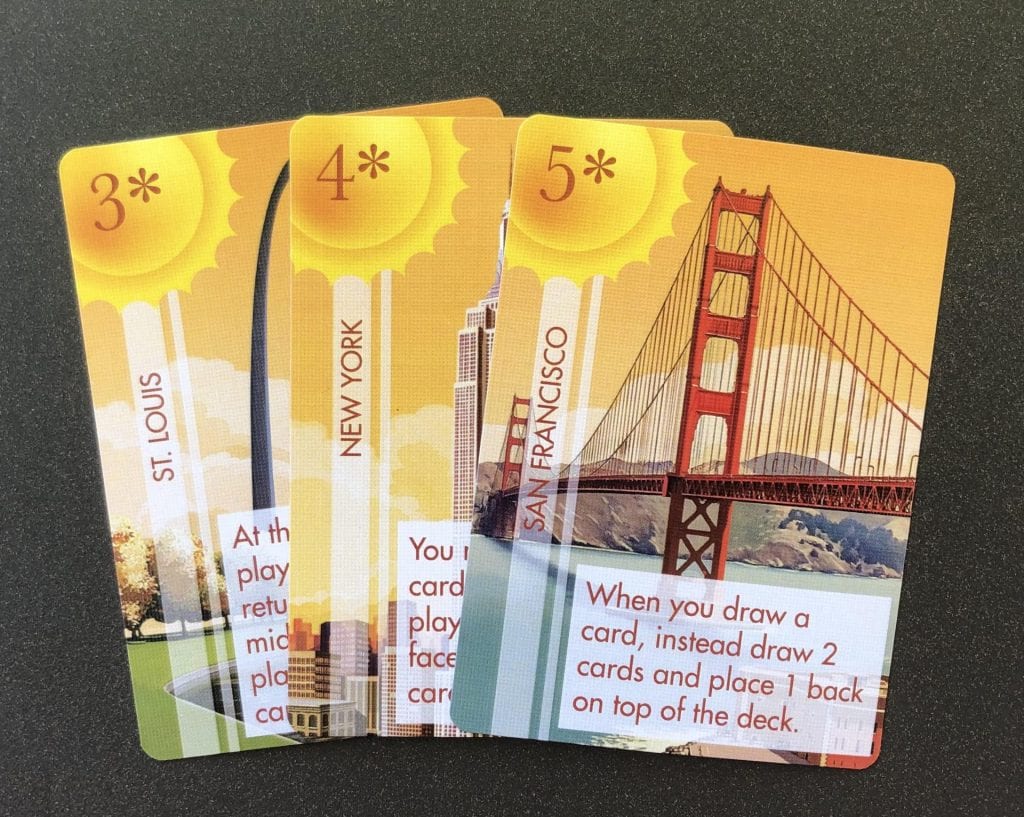
…You Can’t Stop!
Top Pop has a pleasant poker-like quality, full of clever plays where someone sneaks in to grab something uncontested while everyone’s eyes are elsewhere as well as big visceral moments where a player drops a massive stack of caps on a hotly-contested card and the other players sit back in shock. There’s plenty of bluffing and tense back-and-forth bidding battles. All of that action is packed into a breezy 20-30 minutes. Once the deck runs out, the game draws naturally to a conclusion as the fountain of caps dries up.
It’s also a lot lighter and a bit more predictable than poker. Players who can count cards will have a huge advantage here, even with the face-down cards in the mix. While taking a singleton isn’t a bad move — it’ll add to the diversity score at the end — most players will want to focus on majority scoring which leads to clearer choices. Once a player takes a 3, well, they’re probably gonna bid hard whenever the next 3 comes up. That face-down card they’re acting coy about? Chances are good that’s a 3 too. There’s a little less room for bluffing than in poker, especially once most of the cards have been accounted for and players are scrambling to make their final plays.
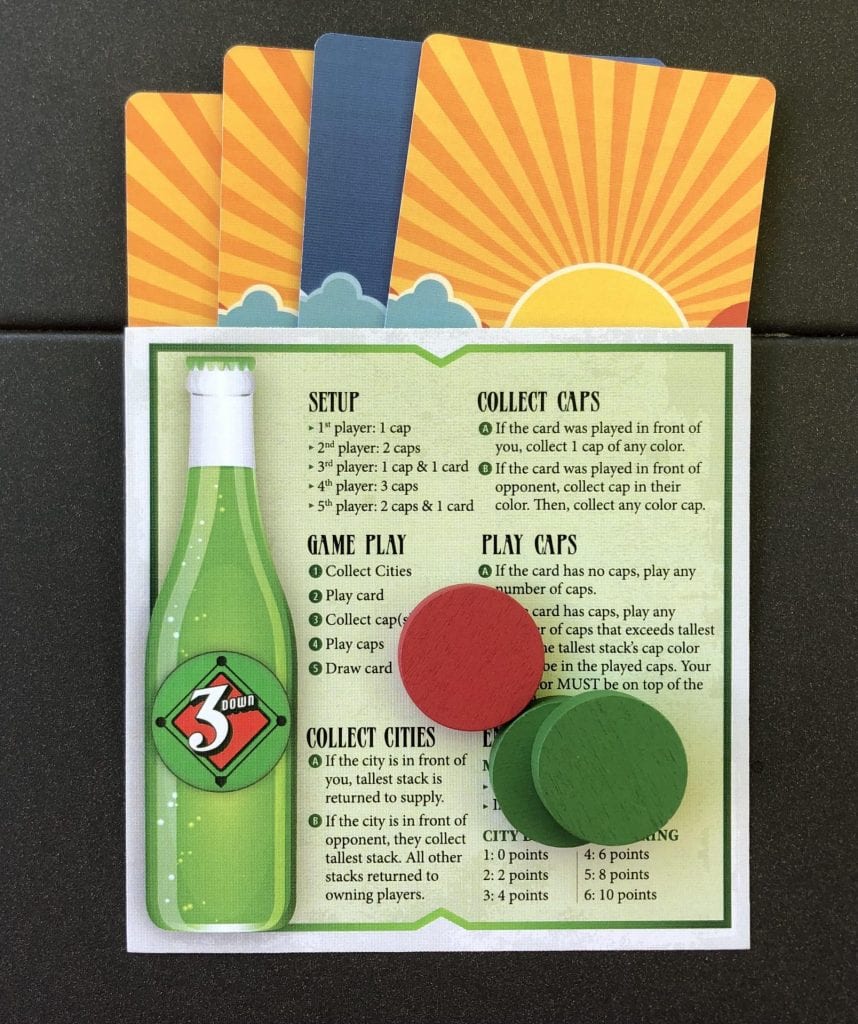
On the flip side, caps aren’t as easily hoarded as chips can be in poker. Outbidding your rivals requires a serious investment of caps. Players rarely hold the cap lead for long since each claimed card unlocks previously-committed stacks. Because caps don’t really matter —– there’s no scoring value for having caps at the end of the game —– those sudden swings only lead to more interesting bets, rather than letting one player outmuscle the others through raw coinage.
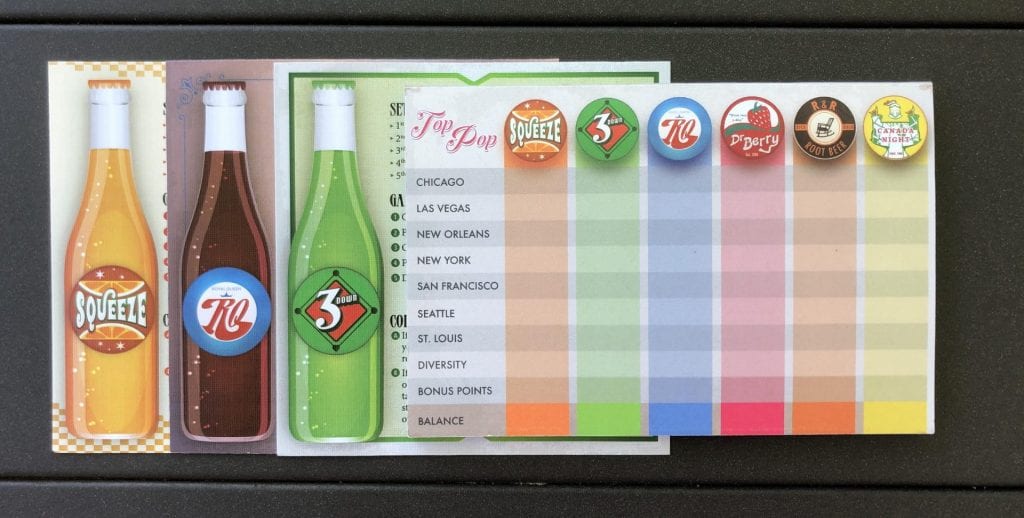
That’s not to say that Top Pop is immune to those kinds of problems. There’s a real potential for kingmaking that can lead to some unfun moments. In one 3-player game, a pair of players boxed out the third for a few rounds by using certain card powers and avoiding bids that would turn a profit for the target. There’s not much a player can do in response except keep betting their meager chips. It won’t happen every time — and at higher player counts it’s less likely — so I’m willing to forgive that experience. Your tastes may vary.
On the whole, though, I quite like Top Pop. It’s smooth and engaging, bottling the fun of poker night in an accessible package. It might not be a must-play but it serves as a perfect refreshing diversion from heavier games. For all your bidding and bluffing needs, back Top Pop on Kickstarter today!




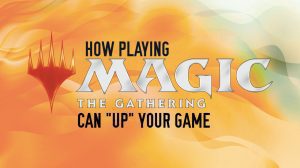
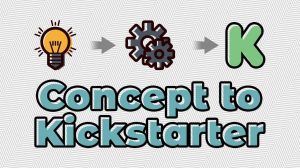
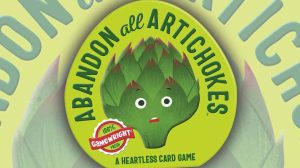




Add Comment